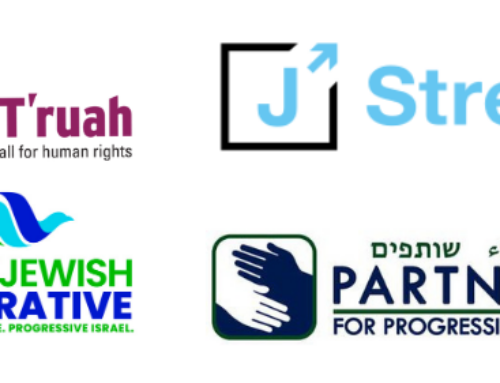This article in NJ Jewish News features the work of our own Phyllis Bernstein (among others): “Gaza war throws focus on Israeli minorities.” These are snippets that focus on Phyllis:
. . . A year ago, the federation’s Israel and Overseas Committee established the Israeli Arab Committee. It is cochaired by Phyllis Bernstein of Westfield, Jim Paul of Summit, and Carol Simon of Millburn. . . .
To Bernstein, Arab equality is an issue of burning importance.
In the wake of the eight-week Operation Protective Edge, which began July 8, she said, “relations between Jews and Arabs have deteriorated in many parts of Israel, and that has lasting effects,” she told NJ Jewish News in a Sept. 17 phone interview.
“Arabs were targeted with comments on social media. They lost their jobs. Jews and Arabs did not travel to each other’s towns, and Arab businesses suffered. Arabs were beaten up in public by Jews, and it became commonplace to hear ‘Death to Arabs’ on the streets — and that is not a good thing.”
Bernstein is particularly concerned with the situation of the Bedouins in the Negev, a region that is especially vulnerable to rocket attacks from nearby Gaza. (Last month, responding to complaints that the Bedouin lacked shelters, the UK chapter of the Jewish National Fund purchased three mobile bomb shelters for Rahat, a predominantly Bedouin city.)
‘In our interest’
In February, Bernstein and her husband, Robert Kuchner, who is chair of the federation’s Israel and Overseas Committee, visited Bedouin communities and schools that Arab and Jewish children attend together.
She believes multi-ethnic education is one way to overcome Israel’s social and economic inequities.
“Helping minorities is good for the country,” she told NJJN. “We as American Jews know that because we are a minority. We want all Israeli citizens to succeed.”
. . . “This is a turning point,” Bernstein insisted. “Either we accelerate all these fragmentations and tensions and economic issues — which will hurt society — and eventually they are going to erupt. Or we will help these people. If we give them the education and opportunity that exists
“It’s clear that Israel has a clear choice: Pursue a path toward a shared society or continue toward more manifestations of racism toward Arabs in Israel,” Bernstein asserted. . . .



This is pretty funny, and yet again shows how out of touch Partners is with the actual “Arabs” whose equality you profess to be working diligently for.
Perhaps one of Partners’ first step could be to call them Palestinians, as most prefer to be called, and stop calling them generic “Arabs?” as Israeli Jews and the state of Israel have decided they should be named? Would seem pretty basic to respect a people’s self-identification. Divide and rule has always been an important colonial strategy and Israel is of course a leading current practitioner.
http://www.haaretz.com/business/1.567704
“Furthermore, 22% of Israel’s Arabs defined themselves strictly as Palestinians and another 45% as Palestinian Israelis. Only 32% defined themselves as the Jewish majority refers to them – Israeli Arabs.”
Good luck with that!
Ted
Ted posted a comment to which I want to respond: To be an Arab living in Israel proper has long been a challenging proposition. Even deciding what to call them has political implications: Arab Israelis? Israeli Arabs? Palestinian Israelis? Or maybe just Palestinians? Arabs in Israel live lives that constantly — often stressfully — straddle two cultures: They are ethnically Arab and citizens of the Jewish state.
We are not talking about Palestinians who live in Gaza and the West Bank. This is sbout Arabs who live inside the Green Line and vote in Israeli elections. Some even serve in Israel’s military.
But when Israel and Hamas were fighting each other and the death toll was rising on both sides, their lives must have become ever more complicated. To some Israelis, after all, Arabs are just a fifth column waiting to turn on them. And for some Arabs, Arab citizens of Israel are simply traitors.
In various news reports, the Arab minority in Israel is selectively termed as “Arab Israelis” or “Israeli Arabs.” Palestinians living in what became Israel call themselves “Palestinians,” sometimes further specifying that they are “Palestinians of ’48” and thus are an integral part of the Palestinian people.
A complex issue for sure.